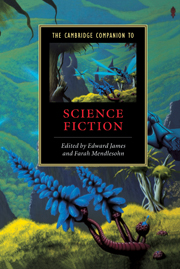8 - Feminist theory and science fiction
from Part 2 - Critical approaches
Published online by Cambridge University Press: 28 May 2006
Summary
Boy meets girl. Boy loses girl. Boy builds girl.
(Anonymous, ‘The Shortest Science Fiction Story Ever Written’)[I]t lifted her heart to think of the stories being written now, new stories, stories of the Free. That was why writing was so important.
(Suzy McKee Charnas)Feminist reading
Like most theoretical projects, feminist thought has generated a variety of conceptual models that, in turn, suggest particular reading strategies encompassing diverse and sometimes conflicting perspectives. Many feminist scholars undertake humanist-oriented literary analysis, while the materialist critiques of Marxist and socialist feminists and the philosophical deconstructions of French feminists have posed challenges to such relatively straightforward reading practices. Some of the most powerful recent critiques of subject and gender construction have been undertaken by queer-feminists such as Teresa de Lauretis and Judith Butler (see Wendy Pearson and Helen Merrick in this volume). Other critical models, of particular interest in the context of sf, have been suggested by cyber-theorists such as Donna Haraway and N. Katherine Hayles, who are concerned with how developments in contemporary science and technology - for instance, advances in reproductive and communications technologies - are shaping and will continue to shape the lives of women.
- Type
- Chapter
- Information
- The Cambridge Companion to Science Fiction , pp. 125 - 136Publisher: Cambridge University PressPrint publication year: 2003
- 11
- Cited by



